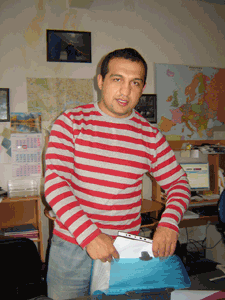Why Reduction of Criminal Age of Responsibiliti?14 to 12 years-of age, rights of children violated
Soso Papuashvili
Nona Suvariani, Tbilisi

The representatives of Georgian NGO protested against reducing the minimum age of criminal responsibility from 14 to 12 years. The NGOs handed a petition to the President to express their grave concern.
The amendments on descending the age of criminal responsibility were enacted by the Parliament of Georgia in 2006. Caroline Hamilton, expert of children’s’ rights and Essex University professor of law was in Georgia when the amendments were adopted. The expert is rather concerned about the severity of the juvenile justice system. She says that when a child gets in penitentiary institution he is unable to leave and become a normal and productive person. She thinks that children must have some alternative to incarceration.
“Georgia differs from western countries in declaring children are criminalized with great ease. It does not happen in developed countries. If a juvenile commits a crime he/she is placed under the supervision of social services and not criminal investigative departments.”
He reported that in 2002 in England 234, 000 children were detained and only 2,000 out of them were actually sent to prison. In Georgia, 75% of children are placed in custody.
The expert considers that jurisdiction system of Georgia is not ready to accept children of 12 or 14 because there are not specially trained police, guards, lawyers, prosecutors, investigators and service personnel who work in prisons and who are actually able to professionally deal with juveniles. However, the UN Convention on the Rights of the Child demands all of the above-mentioned factors to be provided.
Soso Papuashvili, lawyer for the Human Rights Center, stated that the amendments introduced to the Article 33 of the Criminal Code resulted from the increased number of crimes among juveniles. Although European countries have experience in a lower age of criminal responsibility this raises the question as if we should introduce a similar classification in Georgia.
“In addition to that age of criminal responsibility and how it is a very important factor; the more important point is what kind of environment should be created for juvenile prisoners correctional institutions. Unfortunately, they do not comply with the standards estimated by international law. First of all, it should be noted the impropriate kinds of living conditions provided for juveniles at prisons; more than one hundred inmates are placed in a small facility; under such conditions they are deprived from enjoying minimal living standards and normal growth and development.
Generally, juvenile justice system does not work in Georgia. There must be special courts and judges at common courts should not discuss juvenile cases. Judges should have taken special trainings in the subject area; an institute of social workers should exist which will cooperate with juveniles before and after conviction in order to avoid all kinds of repeat crimes.”
UN Committee for the Rights of the Child also criticized the legislative initiative. The committee states in its final report on Georgia published on June 6.
„The Committee strongly urges the State party to reinstate, as a matter of urgency, the minimum age of criminal responsibility to 14 years of age, taking into account the Committee’s General Comment No. 10 (2007) on child rights in juvenile justice, in which States parties are urged not to lower their minimum age of criminal responsibility to the age of 12 (para. 33) on the grounds that a higher age, such as 14 and 16 years of age, contributes to the juvenile justice system, which deals with children who are in conflict with the law and without resorting to judicial proceedings, providing that the child’s human rights and legal safeguards are fully respected, in accordance with the article 40(3)(b) of the Convention“.
The amendment has not been put in force as yet. It had to be enacted on July 1 2008 but because of incomplete justice system the amendments will not start working until January 2009. However, two months ago, Nika Gvaramia, one of the initiator of the amendments, stated at the meeting of protectors of human rights that making such decision was premature.



